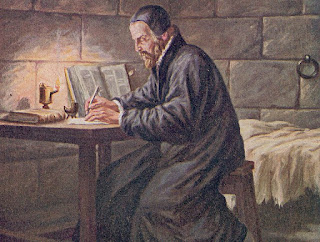I shall now make my incomplete list of the greatest people of the 16th century:
Christopher Columbus (1451-1506) and Vasco da Gama (1460s-1524): Explorers who greatly widened the scope of the world as seen from Europe. Columbus, a Genoese working for Spain, discovered the sea route from Europe to America in 1492 and claimed Caribbean lands for his king, setting a precedent for brutal colonialism; da Gama, sailing south around Africa for Portugal, reached India in 1497, transforming world trade and starting a golden age for his kingdom.
Leonardo da Vinci (1452-1519), Michelangelo Buonarroti (1475-1564), and Rafael (1483-1520): the three greatest artists of the Italian Renaissance, towering figures in Europe's art legacy.
Francisco Pizarro (1471-1541) and Hernan Cortes (1485-1547): The two most successful Spanish conquistadors. Cortes conquered Aztec Mexico in 1521; Pizarro Inca Peru in 1532. These conquests, both greatly aided by the accidental introduction of European smallpox, greatly increased gold and silver production in the Spanish empire.
Nicolaus Copernicus (1473-1543): Polish astronomer who published (on his deathbed) a theory that replaced the classical view of a geocentric universe with a heliocentric solar system. This theory, resisted by the Roman Catholic Church, is central to modern astronomy and ultimately led to the theory of a universe with NO center.
Martin Luther (1483-1546): German heretic whose 95 Theses started the Reformation, which resulted in most of northern Europe breaking away from the Roman Catholic Church.
Babur (1483-1530) and Akbar (1542-1605): The two greatest rulers of Moghul India. Babur, starting from today's Afghanistan, established the Moghul Dynasty in India with his 1526 conquest of Delhi; Akbar brought the empire to its pinnacle, dominating northern India.
Ismail I (1487-1524): First Safavid Shah of Iran, unifiying the nation for the first time in centuries under the Shi'ite sect distinct from its Sunni rival the Ottoman Empire.
Saint Ignatius Loyola (1491-1556): First Superior General of the Society of Jesus. The Jesuit order he founded, with an emphasis on intellectual rigor and assertive salesmanship, became one of the leading organs of the Counter-Reformation and is still active today.
Henry VIII (1491-1547) and Elizabeth I (1533-1603): England's two great Tudor monarchs, father and daughter, who reigned for over eighty years between them. Their age was a turbulent time for England, marked by the Reformation, cultural advances and the beginnings of England's overseas empire.
Suleiman the Magnificent (1494-1566): Long-reigning Turkish Sultan who brought the Ottoman Empire to its peak with the conquest of eastern Hungary, dominating the eastern Mediterranean and posing a challenge to Christian Europe.
William Tyndale (ca. 1494-1536): Reformation scholar known for his work translating Biblical scripture into English. Though put to death by Imperial officials, his legacy lives on in the greater part of the King James Bible.
Gustav I (1496-1560): First king in the Vasa dynasty, establishing Sweden's independence from the Danish-Norwegian union and overseeing the society's conversion to Lutheranism.
Charles V (1500-58): Habsburg Holy Roman Emperor and King of Spain for almost forty years. He assembled a huge realm but faced increasing pressure from the Reformation in northern Germany, and ultimately bequeathed the Empire and the Spanish kingdom to different heirs.
John Calvin (1509-64): French-born theologian who became a Reformation leader in Geneva. He founded the tradition of Dissenter sects that would be carried on by churches such as the Baptists, the Presbyterians and the Dutch Reformed Church.
Andreas Vesalius (1514-64): Flemish physician whose publication De Humani Corporis Fabrica established modern anatomy.
Philip II (1527-98): Habsburg king of Spain for over forty years, ruling an empire that included much of the Americas, Italy, the Netherlands and eventually Portugal. His challenges included the Counter-Reformation, economic absorption of inflationary bullion from the colonies, new English rivalry and a persistent insurgency in Holland.
Ivan the Terrible (1530-84): First Tsar of Russia, he turned the Grand Duchy of Muscovy into an empire, defeating Tartars and rebels and starting the eastward expansion into Siberia. During his long reign he became notorious for tyrannical methods and explosive rage.
William the Silent (1533-84): Prince of Orange who led the Dutch rebellion against Spanish Catholic rule, becoming first Stadtholder of the United Provinces.
Michel de Montaigne (1533-92): French philosopher whose essays stand as an early example of modern thinking.
Domenikos
Theotokopolous "El Greco" (1541-1614): Greek-born painter who became the greatest artist of Habsburg Spain.


























No comments:
Post a Comment